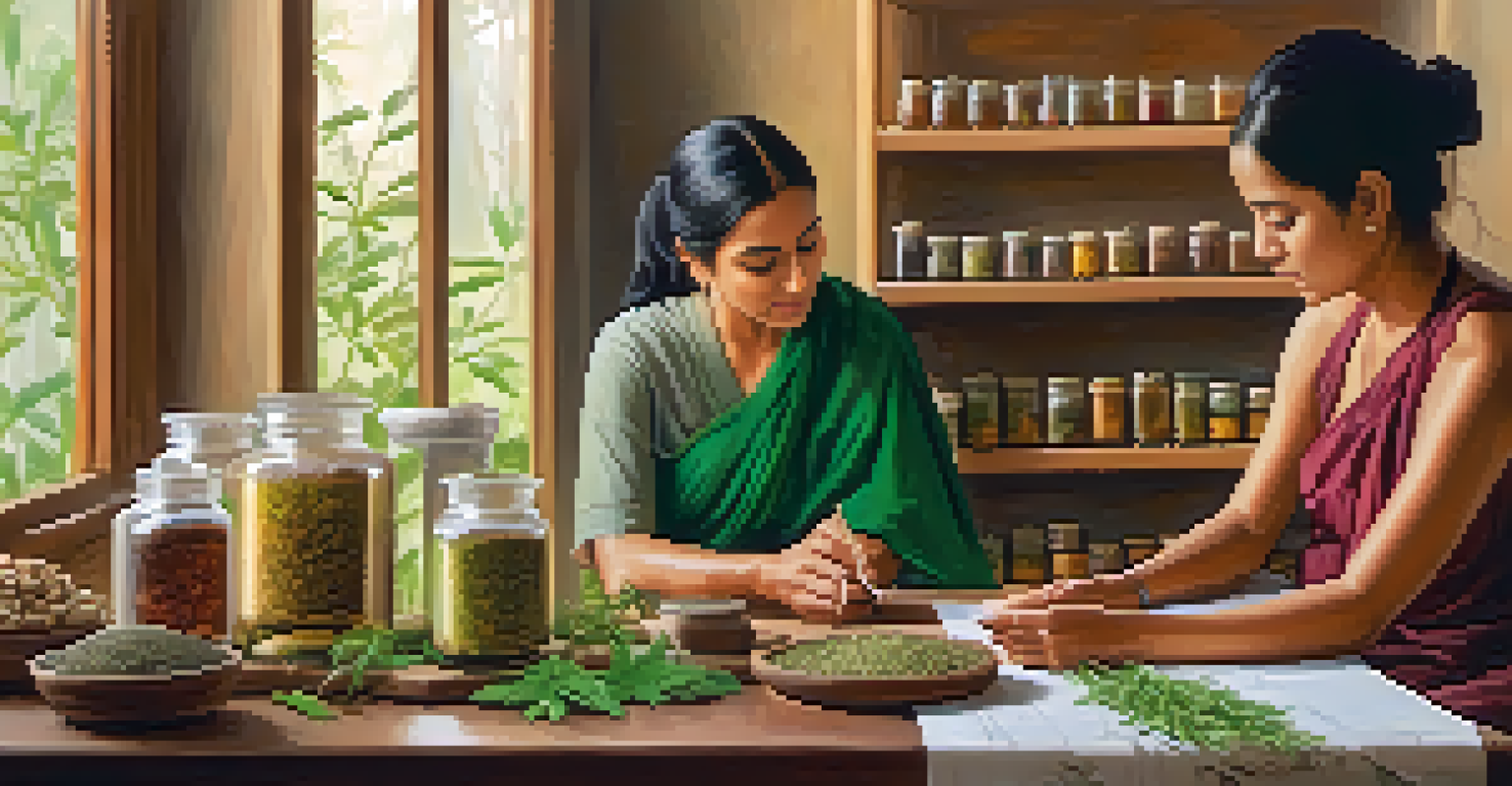Cultural Responses to Illness: Case Studies from Around the World

Understanding Cultural Perspectives on Illness
Culture shapes how individuals perceive health and illness. Different societies interpret symptoms and diseases based on their unique beliefs and practices. For instance, in some cultures, physical ailments might be seen as a spiritual imbalance rather than just a medical issue.
Health is a state of complete harmony of the body, mind, and spirit.
This cultural lens influences not only personal responses but also community practices surrounding illness. In many Indigenous cultures, holistic approaches involving nature and community healing are prevalent. This contrasts sharply with the Western focus on biomedical interventions.
By recognizing these cultural perspectives, healthcare providers can foster better communication and create more effective treatment plans. Understanding a patient’s background allows for a more empathetic approach, bridging gaps between traditional and modern medicine.
Case Study: Traditional Chinese Medicine Practices
In China, Traditional Chinese Medicine (TCM) offers a fascinating example of cultural responses to illness. TCM emphasizes balance within the body, using practices like acupuncture, herbal remedies, and tai chi to restore health. The approach is deeply rooted in the philosophy of yin and yang, which represents the dual nature of existence.

Patients often seek TCM for chronic conditions, finding it a holistic alternative to Western medicine. This reflects a cultural preference for treatments that promote overall well-being rather than just alleviating symptoms. The integration of mind, body, and spirit is paramount in TCM, making it a comprehensive health strategy.
Cultural Views Shape Health Practices
Different cultures interpret health and illness through unique beliefs, significantly influencing community practices and individual responses.
As globalization continues, TCM is gaining popularity outside of China, influencing health practices worldwide. This cross-cultural exchange highlights the importance of understanding and respecting different medical traditions to enhance patient care.
Case Study: Ayurveda in India
Ayurveda, a traditional healing system from India, offers another distinct cultural response to illness. This ancient practice focuses on balancing the three doshas—vata, pitta, and kapha—which represent different bodily energies. Each person's unique constitution determines their health and wellness strategies.
The greatest medicine of all is teaching people how not to need it.
Ayurvedic treatments often include dietary adjustments, herbal medicines, and lifestyle changes that align with an individual’s constitution. This personalized approach contrasts sharply with the one-size-fits-all model often seen in Western medicine, emphasizing prevention and holistic health.
As Ayurveda gains traction globally, it showcases the significance of cultural heritage in shaping health practices. Its principles encourage a deeper connection to nature and self-awareness, which can lead to sustainable health choices.
Case Study: Western Medicine’s Cultural Influence
In Western cultures, the response to illness is heavily influenced by scientific advancements and technological innovations. The focus is often on diagnosis and treatment through pharmaceuticals and surgical procedures. This approach reflects a cultural belief in progress and control over nature.
However, this reliance on technology can sometimes lead to a disconnect between patients and their personal experiences of illness. Many individuals may feel reduced to mere cases or statistics rather than whole people with unique stories. This can impact mental health and patient satisfaction.
Traditional Medicine Gains Global Popularity
Systems like Ayurveda and Traditional Chinese Medicine are increasingly adopted worldwide, highlighting the blend of traditional and modern health practices.
Recognizing the limitations of this approach, there’s a growing movement towards integrating holistic practices into Western medicine. Mindfulness, psychotherapy, and patient-centered care are becoming more prominent, fostering a balance between technological efficiency and personal connection.
Case Study: Indigenous Healing Practices
Indigenous cultures around the world often employ unique healing practices that are intertwined with their spiritual beliefs. For example, Native American healing rituals focus on the harmony between the individual and the community, often utilizing sweat lodges, herbal remedies, and storytelling as part of the healing process.
These practices illustrate how illness is viewed not just as an individual problem but as a communal one. The support of the community plays a crucial role in the recovery process, highlighting the interconnectedness of health and social bonds. This communal approach fosters resilience and collective healing.
Such healing methods challenge the dominant medical paradigms, advocating for a more inclusive view of health. They remind us of the importance of cultural traditions and the need for healthcare systems to respect and integrate these practices.
Globalization and Its Impact on Cultural Health Practices
Globalization has significantly influenced cultural responses to illness, often leading to a blend of traditional and modern medical practices. As people move and share ideas, traditional healing methods are being adopted in urban settings, creating a hybrid approach to health.
This blending can enrich healthcare options, providing patients with a wider array of choices. However, it also raises concerns about the potential dilution of traditional practices and the commercialization of cultural healing methods. Maintaining authenticity while adapting to modern needs is a delicate balance.
Cultural Sensitivity Enhances Care
Recognizing and integrating diverse cultural perspectives in healthcare can lead to improved patient satisfaction and health outcomes.
Ultimately, globalization emphasizes the need for cultural sensitivity in healthcare. Understanding and respecting diverse medical traditions can lead to improved health outcomes and greater patient satisfaction.
Future Directions in Cultural Health Responses
As we look to the future, the intersection of culture and health will likely continue to evolve. There is increasing recognition of the importance of cultural competence in healthcare systems worldwide. This involves understanding patients’ cultural backgrounds and integrating their values into treatment plans.
Innovative practices such as telemedicine are also making it easier to access traditional healers and cultural health resources. This can empower patients to choose treatments that resonate with their beliefs, leading to more personalized care.

Overall, fostering a dialogue between different medical systems can enhance our understanding of health and wellness. By valuing diverse cultural responses to illness, we can create a more inclusive and effective healthcare landscape.